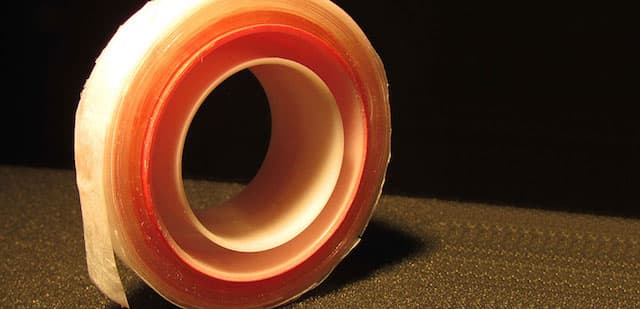This tape sticks to almost any surface and hates water and oils
Professor Arun Kota, from the School of Biomedical Engineering at Colorado State University has developed a 'super tape' that sticks to almost any surface and offers liquid repelling properties to it. This 'superomniphobic' tape was described in the latest publication by #-Link-Snipped-#. The tape forms an air cushion between the liquid or oil and the solid surface; thus preventing liquids from staying on the surface. Professor Kota has put in almost a decade of research in developing the tape and in the process achieved many breakthroughs.
The end product developed by Professor Kota is similar to that of a regular Scotch Tape but goes a step further by making the surface water and oil proof. The researchers believe that the industrial applications of their work are plenty.

Prof. Kota along with postdoctoral fellow Wei Wang and doctoral student Hamed Vahabi have been researching superomniphobic surfaces and coatings since 2007. At present most of such coatings can be sprayed or etched on to any surface. The process however is not economical as it involves advanced equipments and complicated techniques. These techniques will often require a skilled professional to do the job.
On the other hand, the tape developed by Prof. Kota and his team can be used by anyone. The researchers believe that this will make the tape a more practical solution for several civilian, military and even commercial applications. Prof. Kota has already filed a patent and is already in talks with adhesive manufacturers.
Source: <a href="https://source.colostate.edu/liquid-repellant-tape-latest-innovation-csu-materials-lab/" target="_blank" rel="noopener noreferrer">Liquid-repellant tape is latest innovation from CSU materials lab</a>
The end product developed by Professor Kota is similar to that of a regular Scotch Tape but goes a step further by making the surface water and oil proof. The researchers believe that the industrial applications of their work are plenty.

Prof. Kota along with postdoctoral fellow Wei Wang and doctoral student Hamed Vahabi have been researching superomniphobic surfaces and coatings since 2007. At present most of such coatings can be sprayed or etched on to any surface. The process however is not economical as it involves advanced equipments and complicated techniques. These techniques will often require a skilled professional to do the job.
On the other hand, the tape developed by Prof. Kota and his team can be used by anyone. The researchers believe that this will make the tape a more practical solution for several civilian, military and even commercial applications. Prof. Kota has already filed a patent and is already in talks with adhesive manufacturers.
Source: <a href="https://source.colostate.edu/liquid-repellant-tape-latest-innovation-csu-materials-lab/" target="_blank" rel="noopener noreferrer">Liquid-repellant tape is latest innovation from CSU materials lab</a>
0
